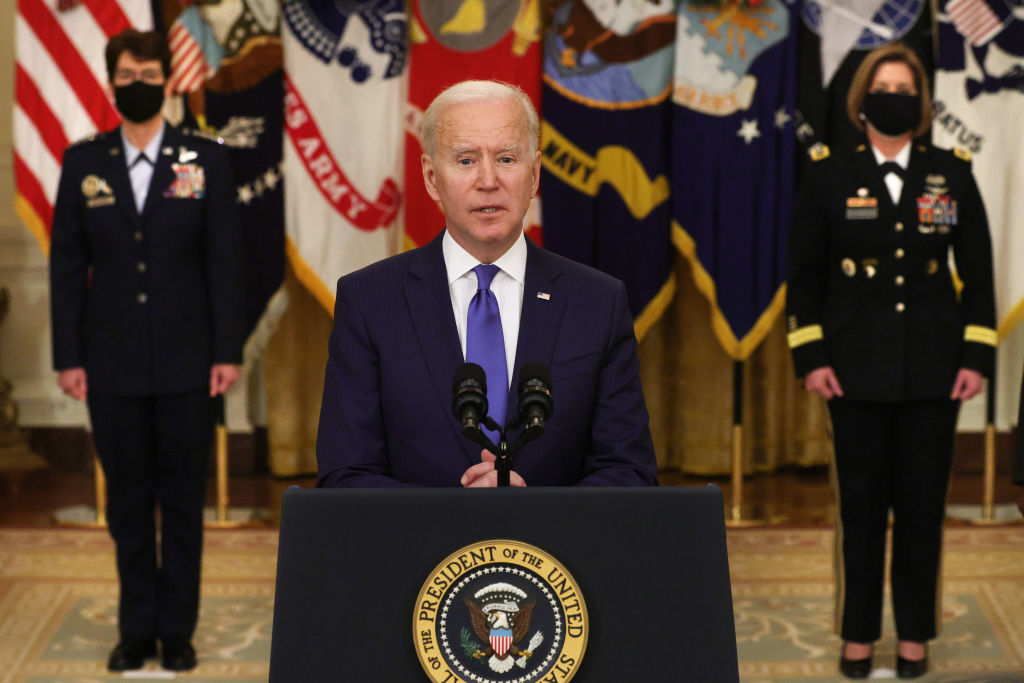5 big economic predictions about Biden's COVID-19 relief bill


A free daily email with the biggest news stories of the day – and the best features from TheWeek.com
You are now subscribed
Your newsletter sign-up was successful
The House is expected to pass the Senate-amended version of President Biden's $1.9 trillion COVID-19 relief bill Wednesday before sending it to the Oval Office for a presidential signature. Here are five predictions on how the stimulus will affect the U.S. and global economies going forward.
U.S. growth — A group of economists surveyed by The Wall Street Journal forecasts a year-over-year 5.95 percent bump in economic growth in the U.S. in 2021, an increase from their January projection. Some economists suggested the prediction is conservative, but either way it would be the U.S. economy's fastest burst since it grew 7.9 percent in 1983. Morgan Stanley expects the U.S. economy to grow by 7.3 percent.
Added jobs — The Journal survey anticipates employers adding an average of 514,000 jobs every month over the next four quarters. Treasury Secretary Janet Yellen said Monday the U.S. labor market should return to its pre-pandemic health by next year, while Bloomberg reports several economists similarly see the jobless rate falling back to around 3.8 percent.
The Week
Escape your echo chamber. Get the facts behind the news, plus analysis from multiple perspectives.

Sign up for The Week's Free Newsletters
From our morning news briefing to a weekly Good News Newsletter, get the best of The Week delivered directly to your inbox.
From our morning news briefing to a weekly Good News Newsletter, get the best of The Week delivered directly to your inbox.
Global spillover — The Organization for Cooperation and Development on Tuesday raised its forecast for 2021 to 5.6 percent global economic growth, and the U.S. stimulus was a major factor. "This will not only boost the U.S. economy, but it will fuel global growth through increased demand in the U.S. and from the U.S. to the rest of the world," OECD Chief Economist Laurence Boone said. Mexico and Canada, particularly, should benefit, Bloomberg notes.
Child poverty reduction — A recent study found that the bill's plan to temporarily raise the child tax credit should cut child poverty in the U.S. by 45 percent, The New York Times reports.
Rising inflation — Inflation will rise (the Journal survey settled on a 2.48 percent increase in consumer prices by December) and there's concern that could force the Federal Reserve to raise interest rates, potentially dealing a blow to the economy and labor market before they completely recover. But many economists expect inflation to gradually fall after a mid-year apex, making "uncontrolled overheating" of the economy unlikely.
A free daily email with the biggest news stories of the day – and the best features from TheWeek.com
Tim is a staff writer at The Week and has contributed to Bedford and Bowery and The New York Transatlantic. He is a graduate of Occidental College and NYU's journalism school. Tim enjoys writing about baseball, Europe, and extinct megafauna. He lives in New York City.
-
 Political cartoons for February 21
Political cartoons for February 21Cartoons Saturday’s political cartoons include consequences, secrets, and more
-
 Crisis in Cuba: a ‘golden opportunity’ for Washington?
Crisis in Cuba: a ‘golden opportunity’ for Washington?Talking Point The Trump administration is applying the pressure, and with Latin America swinging to the right, Havana is becoming more ‘politically isolated’
-
 5 thoroughly redacted cartoons about Pam Bondi protecting predators
5 thoroughly redacted cartoons about Pam Bondi protecting predatorsCartoons Artists take on the real victim, types of protection, and more
-
 TikTok secures deal to remain in US
TikTok secures deal to remain in USSpeed Read ByteDance will form a US version of the popular video-sharing platform
-
 Unemployment rate ticks up amid fall job losses
Unemployment rate ticks up amid fall job lossesSpeed Read Data released by the Commerce Department indicates ‘one of the weakest American labor markets in years’
-
 US mints final penny after 232-year run
US mints final penny after 232-year runSpeed Read Production of the one-cent coin has ended
-
 Warner Bros. explores sale amid Paramount bids
Warner Bros. explores sale amid Paramount bidsSpeed Read The media giant, home to HBO and DC Studios, has received interest from multiple buying parties
-
 Gold tops $4K per ounce, signaling financial unease
Gold tops $4K per ounce, signaling financial uneaseSpeed Read Investors are worried about President Donald Trump’s trade war
-
 Electronic Arts to go private in record $55B deal
Electronic Arts to go private in record $55B dealspeed read The video game giant is behind ‘The Sims’ and ‘Madden NFL’
-
 New York court tosses Trump's $500M fraud fine
New York court tosses Trump's $500M fraud fineSpeed Read A divided appeals court threw out a hefty penalty against President Trump for fraudulently inflating his wealth
-
 Trump said to seek government stake in Intel
Trump said to seek government stake in IntelSpeed Read The president and Intel CEO Lip-Bu Tan reportedly discussed the proposal at a recent meeting
